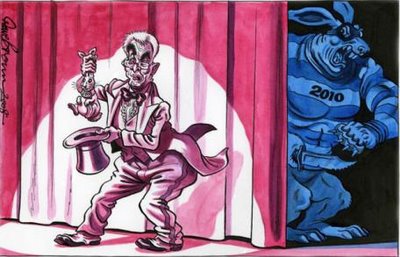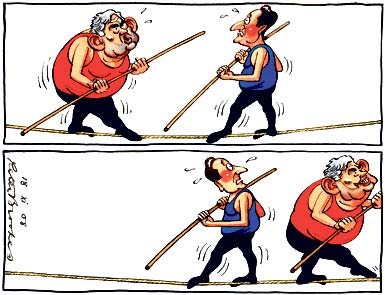Advertising bombshells.

The problem with combining political strategy with advertising campaigns is that when the facts change you can be quickly left looking daft.
This is exactly the trap that the Conservatives have fallen into. Last week, when all we had was rumours and guesswork over what was going to be in the pre-budget report, but where the inkling was that the government was going to produce a stimulus package worth somewhere in the region of between £15bn and £30bn, the Tories thought they were being incredibly clever by bringing back their 1992 tax bombshell campaign. Cheap, effective and simple, and they tried something similar back in 2003. It's partly down to this campaign that Alistair Darling had to set out in such detail how he was going to pay for it, which he did to a fairly decent extent. As it turned out, this wasn't really a bombshell budget in tax terms; yes, the borrowing figures are frightening, but this was negated by the taxing of the rich, which was the distraction measure and sop to the left rather than the main revenue raiser. The real surprise was that national insurance would go up by 0.5%, the part that could be accurately described at least as a potentially painful tax rise.
Almost all of the Conservative fire was concentrated on the national debt. The drop in VAT was the distraction, until an apparently wrongly issued, uncorrected paper on the changes to the tax system still read that VAT was to rise by 1% after 2011, to 18.5%. It was a pretty obvious mistake, as the government quickly made clear, also admitting that they had discussed raising VAT but had decided in the event to raise national insurance instead. You can't however blame the Conservatives for seizing on it, and trying to make hay with the idea that this was a secret plan to raise VAT, with the government not being straight about it. Fair enough.
What you cannot then realistically say is that a 1% rise in VAT is going to be a bombshell, especially when you have been sniffy about a 2.5% drop in the first place. True enough, VAT is a regressive tax, which hits the low paid who don't save but instead spend far harder than it does anyone else. Raising it by 1% would hurt them; Daniel Davies estimates that the cut gives someone working 40 hours a week on the minimum wage £2 a week back, so it isn't outlandish to suggest that a 1% raise would cost them between £40 and £60, possibly more, a year. Not a major sum, but for someone struggling it can more than make a difference. It is not though by any stretch of the imagination a tax rise which is going to put someone into instant penury, especially the mythologised "hard-working families" which both parties so bend over to talk about and discuss. It's equally risible that the country is going bankrupt, as Cameron also claimed at prime minister's questions.
The problem for the Conservatives is getting the balance right between such potentially damaging statements as the country is going bankrupt, which scares people, and attacking the government's lackadaisical and potentially even more damaging plans. Likewise, their own proposals are both rightly and wrongly being lost in the mire, more rightly judging by Cameron's piss-poor examples of what they would do differently, their promised freezing of council tax being revenue neutral and the other two suggestions ones that the government is already doing. Technically, all they have to do is sit and wait and see if the cut in VAT has an effect: if it doesn't, they can claim that their stance was the right one all along. If not, they might be in further trouble. Even then, there's no accounting for whether the public then decide that the softening of a recession created more than in part by Brown means that they'll vote Labour. The Conservatives might still be floundering somewhat, but the end result is still far from certain.
Labels: Alistair Darling, Conservatives, David Cameron, economics, Gordon Brown, politics, pre-budget report, recession, tax cuts, tax increases



